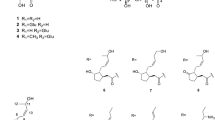Abstract
GALLOCATECHIN, or 5′-hydroxycatechin, was first isolated from Japanese green tea by Tsujimura1 in 1934, and later shown by Bradfield and Bate-Smith2 to be l-epigallocatechin. d-Gallocatechin was obtained by Oshima (Osima)3 in 1939 from the bark of Formosan Casuarina equisetifolia and termed ‘casuarin’.
This is a preview of subscription content, access via your institution
Access options
Subscribe to this journal
Receive 51 print issues and online access
$199.00 per year
only $3.90 per issue
Buy this article
- Purchase on Springer Link
- Instant access to full article PDF
Prices may be subject to local taxes which are calculated during checkout
Similar content being viewed by others
References
Tsujimura, M., Sci. Papers Inst. Phys. Chem. Res. (Tokyo), 24, 149 (1934).
Bradfield, A. E., and Bate-Smith, E. C., Biochim. Biophys. Acta, 4, 441 (1950).
Oshima, Y., Bull. Agric. Chem. Soc., Japan, 15, 109 (1939).
Roux, D. G., J. Soc. Leather Trades' Chem., 36, 274 (1952).
Roberts, E. A. H., and Wood, D. J., Biochem. J., 53, 332 (1953).
Mayer, W., Symposium on Vegetable Tannins, Cambridge (1956), Society of Leather Trades' Chemists (in the press).
Author information
Authors and Affiliations
Rights and permissions
About this article
Cite this article
ROUX, D. d-Gallocatechin from the Bark of Casuarina equisetifolia Linn.. Nature 179, 158–159 (1957). https://doi.org/10.1038/179158a0
Issue Date:
DOI: https://doi.org/10.1038/179158a0
This article is cited by
-
Black Wattle Catechin
Nature (1958)
Comments
By submitting a comment you agree to abide by our Terms and Community Guidelines. If you find something abusive or that does not comply with our terms or guidelines please flag it as inappropriate.



